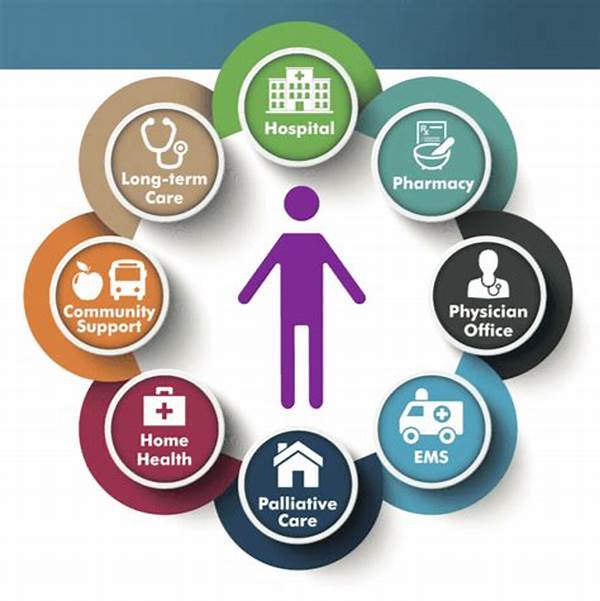Coordinating medications with healthcare providers is an essential aspect of achieving optimal health outcomes. The complexities of modern medical treatments necessitate a collaborative approach, ensuring that medications prescribed are not only effective but also safe for the patient. Proper coordination involves open communication, continuous monitoring, and active involvement from both patients and healthcare providers. The growing role of pharmaceuticals in treatment protocols makes the task of managing and coordinating medications with healthcare providers increasingly significant.
Read Now : Dermatologist-recommended Toxin-free Products
Importance of Coordinating Medications
Coordinating medications with healthcare providers is crucial for ensuring patient safety and treatment efficacy. Miscommunication or lack of coordination can lead to adverse drug interactions, diminished therapeutic effects, and potential health complications. A formal system of medication management allows healthcare providers to track all prescriptions, identify possible risks, and adjust treatments as necessary. Patients benefit from a holistic view of their medication regimens, which fosters compliance and understanding. The strategy of coordinating medications with healthcare providers also facilitates the integration of various healthcare specialties, streamlining patient management across different medical disciplines and enhancing the overall quality of care.
Key Aspects of Effective Coordination
1. Communication: Open dialogue between patients and healthcare providers is vital for coordinating medications effectively.
2. Documentation: Keeping comprehensive and updated records assists in accurate medication management.
3. Monitoring: Regular assessments ensure the safety and efficacy of prescribed medications.
4. Education: Educating patients about their treatment helps improve medication adherence.
5. Integration: Collaboration among different healthcare providers ensures a unified approach to patient care.
Strategies for Successful Coordination
Effective strategies for coordinating medications with healthcare providers include implementing comprehensive medication reviews, employing electronic health records (EHRs), and establishing pharmacist-physician collaborations. Through thorough medication reviews, providers can assess the appropriateness of prescriptions, identify potential drug interactions, and ensure proper dosage. Utilizing EHRs allows for seamless information sharing and helps maintain accuracy in patient records. Such systems play an essential role in coordinating medications with healthcare providers, as they support continuity of care across various treatment settings. Additionally, collaborations between pharmacists and physicians enhance the precision of medication management, ensuring all healthcare providers have accurate and up-to-date information.
Informal Perspectives on Medication Coordination
1. Coordination ensures meds work smoothly without clashes.
2. Docs and pharmacists teaming up means fewer side effects.
3. Keeping track of prescriptions prevents medication mix-ups.
4. Good comms with your doc keeps your treatment on point.
Read Now : Innovative Solutions For Medicine Storage Constraints
5. Understanding your meds helps you stay in charge of your health.
6. Tech helps docs stay in the loop with your treatment.
7. Coordination means a hands-on, all-in approach to your health.
8. You’re more than just a list of meds—you’re a partner in your health.
9. Bridging gaps between healthcare pros reduces treatment hiccups.
10. Teamwork in healthcare equals top-notch care for you.
Benefits of Coordination
The advantages of coordinating medications with healthcare providers are manifold. Primarily, it ensures that all healthcare professionals involved in a patient’s care have access to accurate and comprehensive information about the patient’s medication regimen. This mitigates the risk of dangerous drug interactions and unwanted side effects, ensuring patient safety and enhancing treatment outcomes. Coordination also streamlines the treatment process, allowing for adjustments to be made efficiently as the patient’s condition evolves. Moreover, coordination fosters a more personalized approach to healthcare, as providers can consider all aspects of a patient’s health when developing treatment plans. Ultimately, coordinating medications with healthcare providers contributes to the delivery of high-quality, patient-centered care, which is the cornerstone of modern medical practice.
Challenges in Coordination
Despite its importance, coordinating medications with healthcare providers presents several challenges. One significant hurdle is the potential for communication breakdowns between different healthcare providers, especially when patients are seeing multiple specialists who might not have a complete view of the patient’s medication regimen. Another challenge is the often complex nature of modern pharmaceuticals, which can make it difficult for both patients and healthcare providers to maintain an up-to-date inventory of all medications being taken. The integration of technology, while providing solutions for coordination, also requires healthcare systems to adapt and maintain robust IT infrastructures to support electronic health records and other coordination tools. Overcoming these challenges requires a concerted effort from healthcare providers, patients, and policymakers to establish frameworks that support effective medication management strategies.
Conclusion
In summary, coordinating medications with healthcare providers is pivotal in achieving optimal patient care and safety. Through effective communication, diligent monitoring, and the use of technology, healthcare providers can ensure that their patients receive the most appropriate and effective treatments available. A structured, collaborative approach that includes pharmacists, physicians, and the patients themselves can help navigate the complexities of modern pharmaceutical treatments, minimize risks, and improve health outcomes. Continuous efforts to improve coordination are necessary to meet the growing demands of healthcare, underscoring the need for robust systems and communication channels. As the healthcare landscape evolves, the emphasis on coordinating medications with healthcare providers will only become more critical, making it an integral component of future healthcare strategies.
